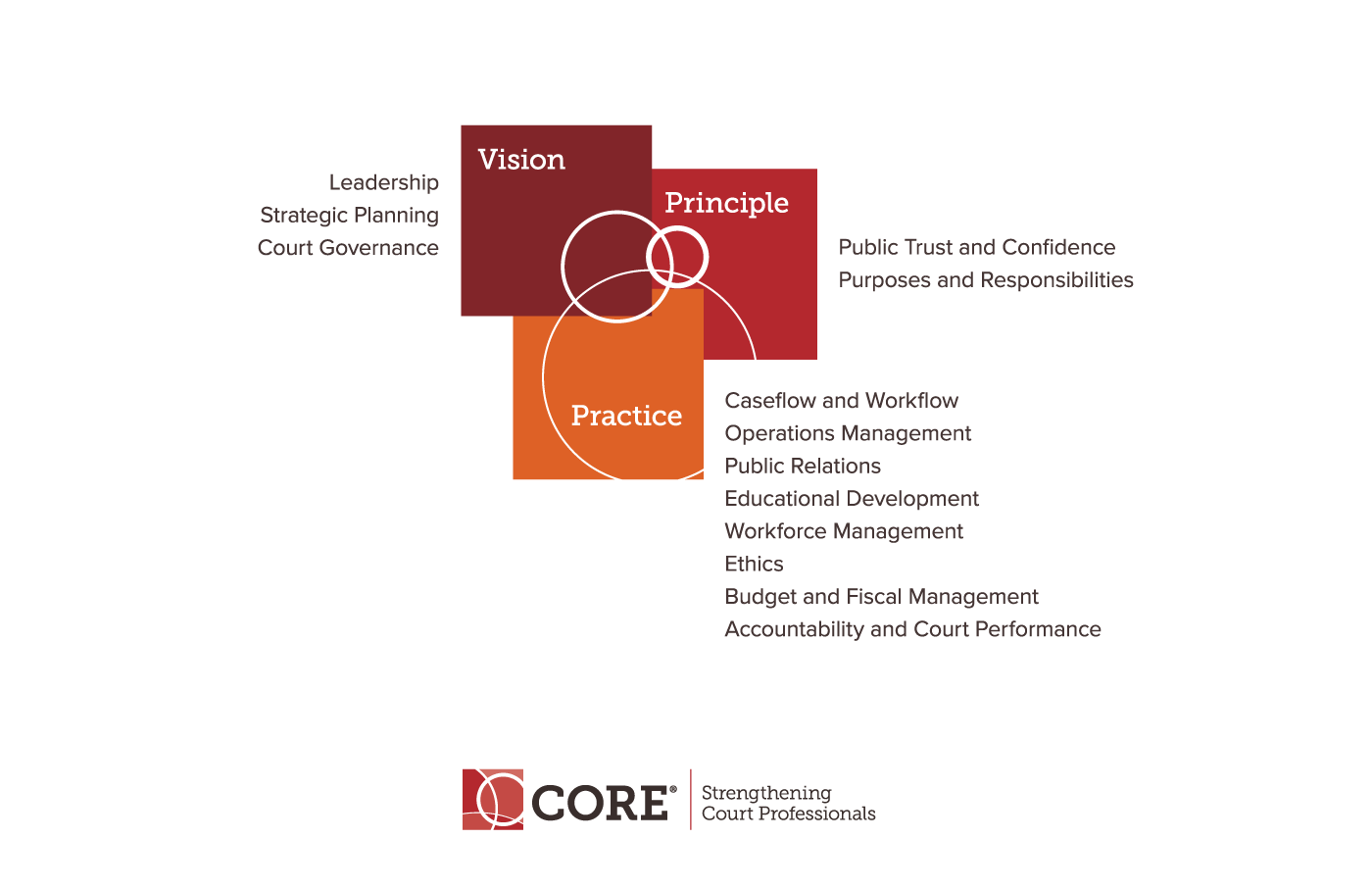Program Overview
Where to Start
Certification candidates may take courses through National Programs (2.5-day in-person courses), Virtual National Programs (4-half day Zoom courses), ICM partnership courses, the ICM Licensee Program and/or the ICM Consortium. Participants may contact their state Administrative Office of the Courts to learn if their state is either part of the ICM Consortium or the ICM Licensee Program. Click here to learn more about partnership opportunities and the Licensee Program.
It is ICM's policy that participants seeking program certification from ICM complete their course of study within a 7-year timeframe for each of the following two levels of certification -- Level One (CCM) and Level Two (CCE). Though courses may be taken in any order, all thirteen courses (6 CCM and 7 CCE) must be completed in order to earn the Certified Court Executive credential. Please note that certification requirements may change in future years as ICM continually revises its curricula.
All six CCM courses can also be completed by participating in a self-study online course (participants are given 90 days to complete coursework at their own pace). Self-study courses are titled differently – see the table below to determine which self-study online course fulfills a CCM requirement.
Check ICM’s course calendar page to view available offerings.
The courses constituting the Certified Court Manager certification program are listed below. The Certified Court Manager credential is awarded after completion of the six CCM courses.
Face-to-Face and Virtual National Program Course Titles | Equivalent Self-Study Course Titles |
|---|---|
| Accountability & Court Performance | Court Performance Standards: CourTools |
| Caseflow & Workflow Management | Fundamental Issues of Caseflow Management |
| Budget & Fiscal Management | Managing Court Financial Resources |
| Workforce Management | Workforce Management (available April 2024) |
| Project Management for Courts | Project Management for Courts |
| Purposes & Responsibilities of Courts | Purposes & Responsibilities of Courts |
ICM courses offer court managers the opportunity to expand their knowledge base and build new skills through the Certified Court Manager (CCM) or Certified Court Executive (CCE) programs.
Since 2011, the CCM and CCE curricula have been closely aligned with the National Association for Court Management (NACM) Core Competencies, now updated and known as the NACM Core. The NACM Core is a summation of the knowledge, skills, and abilities court professionals must have in order to be effective managers and dynamic leaders.
The courses constituting the Certified Court Manager certification program are listed below. The Certified Court Manager credential is awarded after completion of the six CCM courses.
Though courses may be taken in any order, all thirteen courses (6 CCM and 7 CCE) must be completed in order to earn the Certified Court Executive credential. Please note that certification requirements may change in future years as ICM continually revises its curricula.
Course Descriptions
Formerly known as "Court Performance Standards: CourTools"
Description:
This course provides court managers with tools they can use to analyze court performance, implement improvements, and achieve performance goals. Court leaders and managers will learn how to collect, understand, and use data to guide decision making. Participants will also improve their skills in communicating effectively with court leaders about how their court’s data can be used to improve court performance.
As a result of participating in this course, participants will be able to:
- Identify tools that can be used to measure and manage performance, including CourTools.
- Discuss how to collect, evaluate, and analyze court data.
- Demonstrate how measures can be used to assess performance as related to performance targets, such as time standards.
- Discuss how performance measures can be used to guide management, planning, and leadership decisions.
- Develop an action plan for court improvement that incorporates the purposes and responsibilities of courts, performance measurement, the principles of caseflow management, and elements of the High Performance Court Framework.
Formerly known as "Managing Court Financial Resources"
Description:
Designed for court professionals with varying levels of involvement with the court’s budget, this course defines the building blocks of finance and explains how to plan, prepare, review, present, execute, and monitor a budget. Participants will review practical steps courts can take during difficult fiscal times, including maintaining open communication both within the court and with justice partners. In addition, the course explores the relationship between a court’s strategic plan and budgeting.
As a result of participating in this course, participants will be able to:
- Discuss the building blocks of budgeting and fiscal management, including Generally Accepted Accounting Principles (GAAP), assets, liabilities, revenues, and expenses.
- Explain the basics of financial reporting.
- Discuss the perspective of the funding authority and how to compete for budget resources.
- Discuss the financial implications of facilities management.
- Identify the steps involved in planning, preparing, reviewing, presenting, and monitoring a budget.
Formerly known as "Fundamental Issues of Caseflow Management"
Description:
This course examines known and proven elements of caseflow management (case processing protocols and actions) and workflow management (management of the people, procedures, and resources supporting caseflow management activities). Participants will analyze the effectiveness of their court’s current caseflow management system and practices and learn how to apply best practices of caseflow and workflow management to their court. The course helps court professionals understand what is affecting caseflow positively or negatively in their court, and provides practical tools to improve their court’s caseflow and workflow.
As a result of participating in this course, participants will be able to:
- Assess the effectiveness of your court’s caseflow management system.
- Identify steps to reduce the size and age of their court’s pending case inventory and streamline caseflow processes.
- Identify variations in caseload type and complexity and assess implications for caseflow and workflow processes.
- Discuss challenges that influence the ability to change caseflow management processes.
- Develop a system that ensures timely disposition of all cases in collaboration with stakeholders.
Formerly known as "Managing Technology Projects & Technology Resources"
Description:
Project management is an essential skill set for the courts, especially with respect to managing the integration of technology into all aspects of court operations. This course takes participants through the steps of project management, from initial planning to the closing of projects. Participants will learn how to work on all phases of projects, with technology-related projects providing the context for most of the course. Managers at all levels, as well as judges, will find value in this course as they manage projects of all sizes. Court technology professionals will find the course helpful in increasing their understanding of court functions and operations.
As a result of participating in this course, participants will be able to:
- List the component parts of project management, using terminology recognized by practitioners in the professional project management field.
- Identify the planning steps necessary for a successful project.
- Examine project management tools, such as Work Breakdown Structures, GANTT Charts, and Critical Path Analysis, that help keep a project within budget and on schedule.
- Discuss general requirements for monitoring and controlling a project during its execution.
- Identify the elements of a project closing, and explain why each element is essential to the process.
Description:
In this course participants explore the foundations of the third branch of government through an overview of colonial history, the rule of law, and other important historical and current-day events and practices. This course is an opportunity for participants to consider how and why courts often conduct their business differently from each other, despite sharing the same principles. Throughout the course, participants will reflect on whether the performance, structure, operations, and processes of their courts align with the purposes and responsibilities of courts.
As a result of participating in this course, participants will be able to:
- Discuss the purposes and responsibilities of courts and how they have changed over time.
- Discuss key legal concepts, such as due process of law, and their relationship to the purposes and responsibilities of courts.
- Explain the role of the courts as a third branch of government.
- Identify various ways courts are managed and structured as a response to societal expectations and challenges.
- Analyze court governance structures, court organization, and essential functions of courts as they relate to court administration and management.
Formerly known as "Managing Human Resources"
Description:
Workforce management helps an organization achieve its mission and goals by acquiring and maintaining a productive workforce. In this course participants will learn how workforce practices, policies, and procedures can either help a court comply with employment laws or expose the court to significant legal consequences. In addition, participants will learn recruitment, selection, and retention procedures, and performance management principles that encourage a high-performance work environment. Participants will also explore how to develop strong employee relations and the intricacies of interacting with employee interest groups and organized labor. Further, participants will learn the importance of organizational development in a diverse world and the importance of career development, mentoring, and succession planning.
As a result of participating in this course, participants will be able to:
- Identify sound workforce management policies, procedures, and practices for the courthouse work environment.
- Identify and discuss key federal employment laws that impact the courthouse work environment.
- Identify and apply effective recruitment and selection principles, as well as orientation.
- Articulate effective workforce performance management techniques, including workforce development, mentoring, and succession planning.
- Identify and apply employee relations principles, including discipline.

